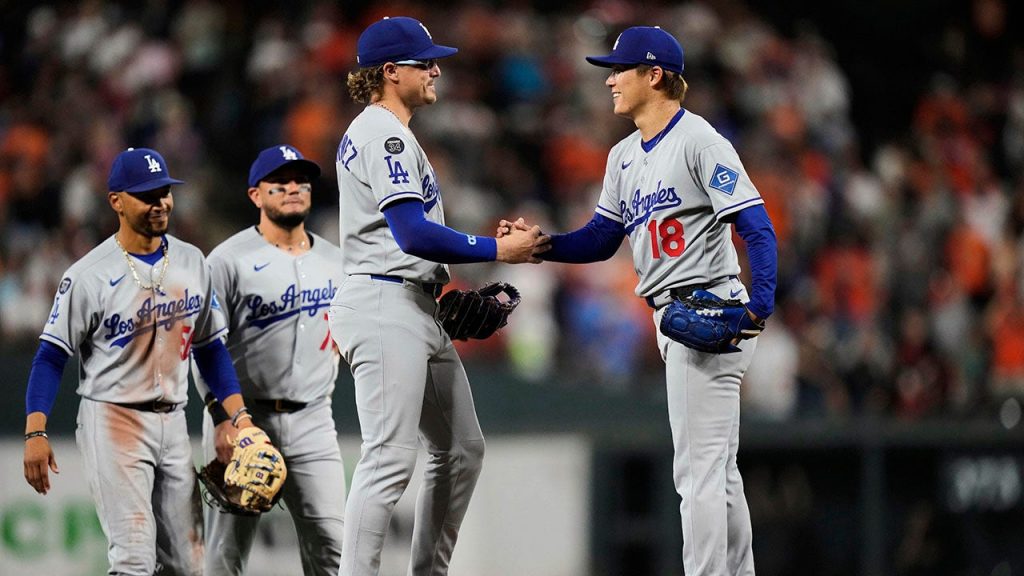A Game of What-Ifs: Dodgers’ Heartbreaking Collapse After Yamamoto’s Near No-Hitter
In the annals of baseball’s cruel twists of fate, Saturday night’s game between the Los Angeles Dodgers and Baltimore Orioles will be remembered as one of the most gut-wrenching collapses of the 2024 season. Yoshinobu Yamamoto, the Dodgers’ prized starter, stood just one out away from baseball immortality—a no-hitter within his grasp after 8⅔ masterful innings. The Japanese phenom had been nothing short of brilliant, recording 10 strikeouts while walking just two batters. The Dodger faithful held their collective breath as Yamamoto faced Jackson Holliday with two outs in the ninth, clinging to a 3-0 lead. Then, in an instant, the dream shattered. Holliday connected on a pitch that sailed over the outfield wall, ending the no-hit bid and reducing the lead to 3-1. What followed was a cascade of decisions and failures that turned what should have been a celebration of pitching excellence into a nightmare that will haunt Dodgers fans for the remainder of the season.
Manager Dave Roberts, perhaps driven by pitch count concerns or simply following modern baseball’s cautious approach to pitcher workload, made the fateful decision to remove Yamamoto after Holliday’s home run. Enter Blake Treinen, tasked with securing the final out and preserving a still-comfortable two-run lead. Instead, what unfolded was a collapse of epic proportions. Jeremiah Jackson immediately doubled. Treinen then hit Gunnar Henderson with a pitch and walked Ryan Mountcastle to load the bases. The comfortable cushion was suddenly in jeopardy, the once-jubilant Dodger Stadium now gripped by tension. Treinen’s control continued to abandon him as he walked Colton Cowser, forcing in a run and cutting the lead to one. Roberts, seeing the game slipping away, summoned Tanner Scott from the bullpen, but the damage was irreversible. Emmanuel Rivera’s single brought home two runners, completing the improbable comeback and sending the Orioles to a shocking 4-3 victory.
The statistical oddity of this collapse cannot be overstated. After Yamamoto’s exit, not a single Dodgers pitcher recorded an out. What makes the loss particularly painful is its context within the heated National League West race. The Dodgers, defending World Series champions, maintained a slim 1.5-game lead over the surging San Diego Padres. Each loss at this stage of the season carries exponential weight, and this one—a game that was effectively won until the ninth inning’s final moments—will be scrutinized for its potential impact on the division race. The Orioles, meanwhile, had nothing to lose at 16 games out of first place in the American League East, playing with the freedom that comes from having no playoff expectations. Their resilience turned what would have been a footnote in their disappointing season into a memorable victory that showcased baseball’s unpredictable nature.
The social media fallout was immediate and fierce, with Dodgers fans expressing their frustration at Roberts’ decision to pull Yamamoto. The manager’s bullpen management has faced scrutiny throughout his tenure, despite his overall success with the team. This particular decision will likely join others in Roberts’ history that have sparked debate, including his handling of pitchers in previous playoff scenarios. The what-if questions abound: What if Yamamoto had faced one more batter? What if a different reliever had been chosen? What if Treinen had been pulled after the first signs of trouble? Baseball’s beauty and cruelty lie in these unanswerable questions, the moments of decision that ripple through games, seasons, and careers.
Lost somewhat in the devastating outcome was the offensive contribution from the Dodgers’ stars. Mookie Betts went 2-for-5 with two RBIs, while Shohei Ohtani added an RBI in a 1-for-5 performance. Their efforts, which would normally headline a victory recap, became mere footnotes in the story of a collapse. For Yamamoto, the night represented both his finest moment in a Dodger uniform and a bittersweet reminder of baseball’s fickle nature. His performance deserved to be celebrated as the first Dodgers no-hitter since Clayton Kershaw accomplished the feat more than a decade ago. Instead, it will be remembered as a brilliant outing that culminated in one of the season’s most stunning defeats, his personal achievement overshadowed by the team’s failure to close out a game that seemed firmly in hand.
The aftermath of such losses often reveals character—both of individuals and organizations. How the Dodgers respond in the coming days will speak volumes about their resilience and championship mettle. For a team with World Series aspirations, the ability to put even the most devastating losses in the rearview mirror becomes essential. As for the Orioles, despite their disappointing season, this comeback victory offers a glimpse of the competitive spirit and talent that could serve them well in future campaigns. Baseball’s long season provides daily reminders of its unpredictability, and Saturday’s game stands as perhaps the most dramatic example of how quickly fortunes can change—how nine innings of dominance can be undone in a matter of moments, how history and heartbreak often stand just one pitch apart. In the game’s unforgiving arithmetic, the Dodgers must now add this stunning defeat to their season’s ledger and move forward, knowing that in baseball, as in life, there is always tomorrow—and always another chance at redemption.


